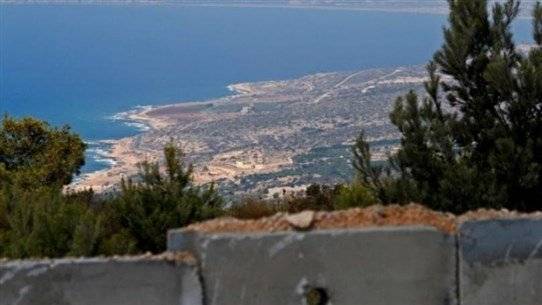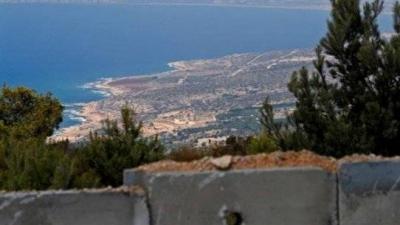The goal was to conclude the term with an achievement that history would one day write about, adding to the "achievements" of what remains of the history of the people and the republic. The architects of the term accomplished this by finalizing a plan for the demarcation of the southern maritime borders outside Lebanese boundaries, promising to secure guarantees "in the Lebanese way."
Yesterday morning, Lebanese President Michel Aoun received a written response regarding the establishment of maritime borders from the American mediator Amos Hochstein, delivered by the U.S. ambassador to Lebanon, Dorothy Shea. Up to this point, what this will reflect in history can be considered an achievement. Even the mechanism that will involve consultations with Presidents Nabih Berri and Najib Mikati, as well as the army leadership which received a copy of the response for review, is beyond reproach.
However, what about the details crafted in the United States, specifically by Deputy Prime Minister Elias Bou Saab, and on what basis did the president build his stance when he announced that there were "breakthroughs in the maritime border demarcation file and that Lebanon will receive what it deserves from its resources, and that the file is at its ‘happy endings’"? Mikati, too, was not less "happy" and optimistic, confirming during the general debate of the 77th session of the General Assembly held in New York Lebanon's commitment to its sovereignty, resources, and rights in its territorial waters.
Only the Israeli side, which announced through its media that "political and security circles in Israel are optimistic about the chances of reaching a final settlement of the maritime border dispute in the near future," revealed the truth by naming things as they are, stating "reaching a settlement" and not an agreement. So what are the details of this settlement, and on what basis are the three presidents and the American ambassador enveloped in "happiness"? Why the insistence from the Lebanese side, following discussions between Aoun, Mikati, and Berri, on "how to proceed and respond quickly"?
The content of Hochstein's message may not be clear at the moment, knowing that presidential sources were content to announce that it "contains an offer for negotiations that took place along with suggestions" without disclosing their nature. However, sources closely tied to the file revealed via "Al-Markaziyya" that the floating line drawn by Israel does not start from Ras Naqoura, which should mark the beginning of maritime border demarcation as it represents a security guarantee for them and has a safe tourist area.
In parallel, the sources clarify that the floating line intrudes into an area of 6 or 7 kilometers from within Lebanese waters, which means cementing the area as disputed and thus conceding line 23 after President Aoun stated on October 12, 2021, that it is the negotiation line, not line 29, which Lebanon relinquished without reason or even reciprocation. It is likely that it was agreed that the floating line would not affect the determination of the Ras Naqoura point in the future, "and this is what the Lebanese state considered an ‘achievement,’" while recognizing the floating line makes the Ras Naqoura point subject to future negotiations by the Israeli side, knowing that Article 2 of the Constitution does not permit relinquishing it.
The proposals made by Hochstein might be seen by the "engineers" of the agreement abroad as an achievement that crowns "the end of Aoun's term," as they reportedly involve Lebanon obtaining line 23 and the entire Qana field, and Lebanon not being responsible for compensating Israel for part of Qana, acknowledgment of Lebanon's right to exploration and extraction, allowing Total company to resume exploration and extraction without linking any land point to the maritime borders, specifically point B1, and finally acknowledgment of Lebanon's right to obtain fuel for electricity from any country, including Iran.
However, for the record, the sources insist on clarifying the following based on what was mentioned in the response content. They state: "Is obtaining line 23 minus the floating line and thus relinquishing part of the territorial waters considered an achievement? Do the Lebanese and the ‘very happy’ presidents realize that the Qana field does not fully belong to Lebanon since Total will compensate Israel from its production? Israel will be a disruptive partner with Total as it falls according to international law under Israeli sovereignty and according to the coordinates existing in the United Nations. This is entirely normal, just as Israel does in the Aphrodite field with Cyprus." Thus, the sources add, we have applied the equation: no extraction from Karish without extraction from Qana.
Also, in the techniques that were surely not discussed by the architects of the agreement on which Hochstein's response was based: if Total's company only digs one well according to the contract signed with Lebanon in Block 9 and does not complete extraction, we would have given permission to begin extraction from the Karish field without extraction from the Qana field, and the responsibility here falls on the drilling company. Is this considered an achievement at the end of President Michel Aoun's term?
Last but not least, the sources ask, "Is linking the sea to the land and keeping the dispute over Ras Naqoura and point B1, defined since 1949, and entrenching Israel's occupation of it indefinitely an achievement? And is this how we liberate the occupied lands?" The maximum hope of the sources is that these doubts are not accurate, but it is certain that the negotiating parties have not touched on these technical points. What matters to them is the achievement of demarcating the southern maritime borders before the president leaves the palace. So, is the agreement a blessing or a curse?




